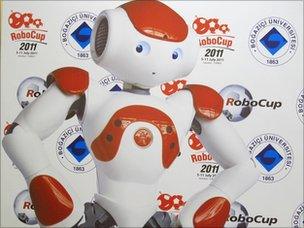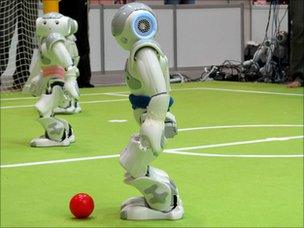UK robot World Cup hopes dashed
- Published
Cetin Mericli is the RoboCup organiser and says all the robots are autonomous, meaning they play with their own software intelligence
The UK's best robot footballers have followed the example of their human counterparts and bombed out of the football World Cup.
The country's first full team was taking part in the 2011 RoboCup in Istanbul over the weekend.
Sadly, the four-strong Edinferno squad from Edinburgh University, was knocked out in the group stages.
The team's coach vowed to return next year with a much improved side.
Dr Subramanian Ramamoorthy, assistant professor at the School of Informatics, said the lack of success was largely due to the fact that the UK has no national RoboCup tournament at which Edinferno could fine tune their hardware, software and strategy.
"Almost all the bugs that stopped us were because we were not match ready," he said.
By contrast, said Dr Ramamoorthy, opposing teams had taken part in their respective national tournaments and honed their players and team work before reaching the final in Turkey.
"I suspect we are one of the few that are here for their first year," he said.
Despite getting knocked out in the early stages, Dr Ramamoorthy said Edinferno had accomplished many of its goals.
"Until this year there was no British team," he said. "And we learned that our core technology is not that bad even though we have not been very successful."
Humanoid
Edinferno took part in the Standard Platform League of the RoboCup which sees all teams use bipedal robots made by French firm Aldebaran Robotics. There are four other leagues covering software-only simulated soccer as well as small, medium and humanoid teams of robots. The RoboCup is the largest gathering of robots on the planet.

The 2011 RoboCup mascot reflects on the match: "All credit to the lads"
Dr Cetin Mericli, organiser of the RoboCup, said the event started in 1997 right after chess grand master Garry Kasparov was beaten by the IBM Deep Blue supercomputer.
Football was settled on as a "grand challenge" to focus the research efforts of robot makers and AI experts so the machines they produce get more competent. It gave them a benchmark against which to measure their progress, he said.
The problems that need to be solved to make a good team of football-playing robots are relevant to the many areas of human life that those thinking machines will have to tackle when they live and work alongside us, said Dr Mericli,
"We want to create robots that are intelligent enough to take care of themselves and to take care of anyone around them so they can be part of our lives," he said.
The competition was definitely starting to produce smarter robots, said Dr Mericli, because the rules governing the competitions regularly had to be revised as the machines and their creators got better at walking, recognising objects, avoiding collisions and working together.
Pitches were now bigger, teams had more players and landmarks to help with navigation were being removed as the robots got smarter and played better.
Household name
The researchers, graduate students and engineers making the robots that take part were driving the development of robotics, said Dr Mericli.
He predicted that the great leaps being made by robotkind would mean an explosion in their numbers within a decade and lead to them becoming household gadgets that people cannot do without.

It was end-to-end play at the robot World Cup
"They will be the mobile phones and smartphones of the future," he said.
The ultimate aim of RoboCup is to produce a team that, by 2050 at the latest, can take on and beat the most recent human Fifa World Cup winning team. Dr Ramamoorthy is in no doubt its a reachable goal.
"I think we could get there," he said. "We can make robots that can win that game as all the pieces are here."
"However," he added, "if we did get there, the result would not be just about football. If you had robots that could win that game they would be useful for so many other things."
The University of Edinburgh's Subramanian Ramamoorthy is training robots to play football
- Published8 July 2011